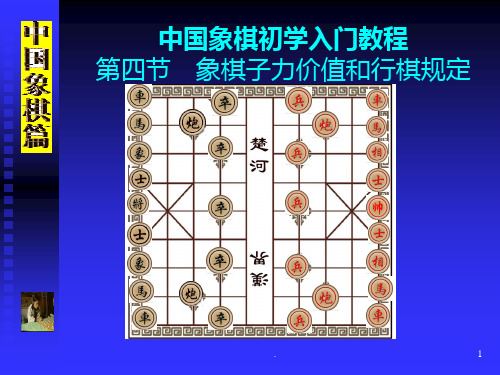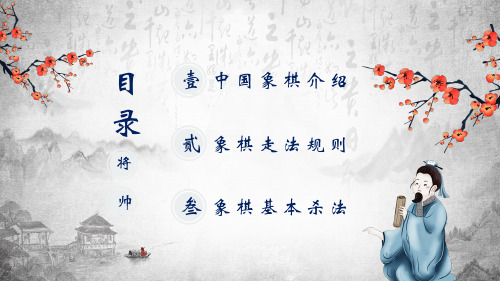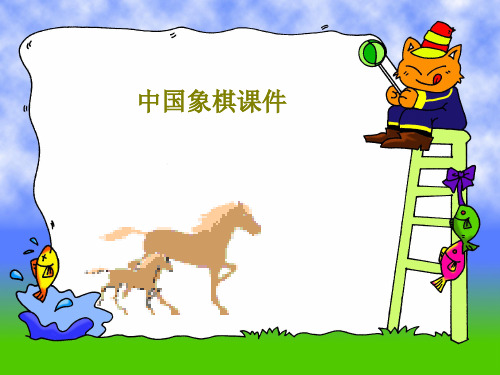中国象棋演示文稿
合集下载
象棋文化ppt课件

棋子的走法与吃法
01
02
03
帅(或将)
只能在宫(或九宫)内斜 走,每步1/2个点位,不 能出宫(或九宫)。
士(或士)
只能在宫(或九宫)内斜 走,每步1个点位,不能 出宫(或九宫)。
象(或相)
斜走,每步2个点位,不 能过河界和越过其他棋子 。
棋子的走法与吃法
马
先横走或竖走一格,再 斜走一格,即“日”字
象棋对于培养人的思维能力和战略意识具有重要作用,因此受到广泛欢迎。
象棋在文化交流和国际交往中发挥了积极的作用,成为展示中国文化的重要载体之 一。
02
象棋的基本规则与玩法
棋盘与棋子
棋盘
由9纵10横共计90个交叉点组成 ,棋子在交叉点上摆放和移动。
棋子
包括帅(或将)、士(或士)、 象(或相)、马、车(或炮)、 炮、卒(或兵)7类,每类棋子有 红黑两种颜色。
形。
车(或炮)
直走,每步任意格数, 不能越过其他棋子。
炮
卒(或兵)
直走,每步任意格数, 吃子时需要隔一子。
直走,每步1个点位,过 河前只能向前,过河后
可向前或左右移动。
象棋的基本战术与策略
01
02
03
04
牵制与反牵制
利用棋子的走法与吃法相互制 约对方棋子移动。
抢占优势
通过合理的布局和攻击手段占 据优势。
攻守兼备
在进攻的同时注意防守,避免 被对方反击。
灵活多变
根据局势变化调整战术和策略 。
03
象棋的文化内涵
象棋与中国传统文化
象棋与中国古代哲学
象棋的棋子、棋盘和规则体现了中国 古代哲学思想,如阴阳五行、天人合 一等。
象棋与古代艺术
中国象棋入门精讲PPT课件

第四节 象棋子力价值和行棋规定
六 常见术语
▪
【绝杀】
▪
指对局,下一着要将死,而
对方又无法解救。
.
20
马位置术语
卧槽马 (三.9位)
.
21
马位置术语
钓鱼马 (三.8位)
.
22
马位置术语
侧面虎 (三.7位)
.
23
马位置术语
挂角马 (四.8位)
.
24
书面规范写法:炮二平五 马8进7 简写:炮2平5 马8进7 简写:炮2平5 马8上7 简写:炮25 马8+7 简写:包25 马8(7)
▪
马、相(象)、士是斜线走
动,移动前后肯定处于不同
的线路,第四个字表示的是
子力终到的线路。
.
4
第一章 象棋概述
第四节 象棋子力价值和行棋规定
三 行棋与吃子
▪
黑象现在有四个点可去,如
图所示。
▪
红相只有一个点可去,不可
越过河界,也不可退到一路。
因有子力(黑卒)塞住相眼。
.
5
第一章 象棋概述
第四节 象棋子力价值和行棋规定
三 行棋与吃子
▪
马每着走一直一斜或一横一
斜,可进可退,俗称马走日。
如果在要去的方向有其它棋
子挡道,俗称蹩马腿,则不
许走过去。
▪
马在没有蹩腿的情况下,最
多可以控制8个点。如图所示。
.
6
第一章 象棋概述
第四节 象棋子力价值和行棋规定
三 行棋与吃子
▪
如图这个马只能控制4个点,
因为另外4个点不可去,因为
分别被两个子力(在马前进 方向上,无论是黑子还是红
中国象棋入门精讲PPT课件

棋子的移动规则
• 兵、卒在没有被吃掉的情况下不能倒退。 • 车在直线方向上只要没有其他棋子阻挡,就可以一直前行。 • 马走日字形,只要没有其他棋子阻挡,就可以走两个格子。 • 炮需要借助一个棋子作为炮架才能攻击对方,炮只能直线前进,不能后退。 • 象只能在河的同一侧直线前进、后退,不能过河。 • 士只能在九宫格内上下左右移动一格。 • 将只能在九宫格内上下移动一格。 • 帅只能在九宫格内左右移动一格。
民间故事
关于象棋的故事和传说在民间广为流传,如“王质烂柯”的故事,表达了世 事变迁、人生如梦的感慨。
象棋的社会意义
社交交流
象棋是一种社交活动,人们可以通过下象棋来交流情感、增进友谊,如“棋逢对 手”和“观棋不语真君子”等说法。
脑力运动
象棋是一种需要高度智力和策略的游戏,下象棋可以锻炼大脑思维能力和反应能 力,有助于预防老年痴呆等疾病。
棋子的特殊走法
将军
01
当一个棋子攻击对方的帅(将)时,被称为将军。此时被将军
的棋子必须立即应将,否则被判为输。
应将
02
被将军的棋子必须进行应对,可以是移动帅(将)的位置或者
吃掉对方的棋子。
吃子
03
当一个棋子攻击到对方棋子时,可以选择吃掉该棋子,吃掉后
该棋子从棋盘上移除。
03
象棋的战术策略
攻守策略
中局判断
在中局阶段,要根据棋盘上的形势和对手的棋子位置,做出准确 的判断和决策,选择合适的进攻方向。
布局陷阱
在布局阶段,可以设置一些陷阱来迷惑对手,使对手落入自己的 圈套中。
残局策略
残局认识
在残局阶段,要了解各种残局的胜负和局面特Βιβλιοθήκη ,并根据实际情况采取合适的策略。
象棋ppt文字介绍

岁爱正 给是了需我要们母您亲是的多时么候的可令是我您敬中却佩国把啊应在象属我于的棋您心走女中儿您法的就那是搏份一杀 介 绍
帅
名活雷锋这是在我
将
宣讲:某某某 时间:20XX.XX
象棋文化
们的校园内在社会上不也有很多这样雷锋式的人吗那是 面对被车辆两次碾压18名路人默然无视的两岁女童小悦 悦而挺身而出的拾荒阿婆陈贤妹;那是照顾非亲爹妈17
象棋ppt文字介绍
我们的班主任赵老师正如这微小的蜡烛一般,用她的青
春和汗水为我们谱写出一首首雄壮的交响曲。那波澜壮
阔的音乐影响着我们的成长,那一个个墨色的音符代表
中 国 象 棋 着老师对我们深深的导言。您就像雷锋一般为教育事业
献出了自己的青春您为了我们牺牲了自己家庭的幸福在 工作岗位上兢兢业业无私奉献记得您说过您的女儿才两
如图,红先: 车一进二 将6进1 车二进一 将6进1 车一退二 (红胜)
红
帅(1个)车、马、炮、相、仕(各2个)兵(5个)
黑
将(1个)车、马、炮、象、士(各2个)卒(5个)
中国象棋 介绍
马走日字,象飞田。 车走直路,炮翻山。 士走斜路护将边。 小卒子一去不回还。 车走直路马踏斜, 相飞田子炮打隔, 卒子过河了不得。
中国象棋 介绍
现行的记谱法一般使用四个字来记录棋子的移动。
象棋基本 杀法
当一方将帅占立中路时,利用双方将帅不得见面的规则做成杀势
图中双方都有车,红方利用对方车的位 置低的弱点,以对面笑杀取胜,着法是 仕五进六,下着车八平六即成对面笑杀。 黑方虽有车,面对红车的杀着,也只有 干瞪眼。
士 士象
将
象
车
仕
仕
车
帅
象棋基本 杀法
当对方将帅暴露在外时,可以利用双车分占两线前后照将的办法,造成“双车错”的杀势。
帅
名活雷锋这是在我
将
宣讲:某某某 时间:20XX.XX
象棋文化
们的校园内在社会上不也有很多这样雷锋式的人吗那是 面对被车辆两次碾压18名路人默然无视的两岁女童小悦 悦而挺身而出的拾荒阿婆陈贤妹;那是照顾非亲爹妈17
象棋ppt文字介绍
我们的班主任赵老师正如这微小的蜡烛一般,用她的青
春和汗水为我们谱写出一首首雄壮的交响曲。那波澜壮
阔的音乐影响着我们的成长,那一个个墨色的音符代表
中 国 象 棋 着老师对我们深深的导言。您就像雷锋一般为教育事业
献出了自己的青春您为了我们牺牲了自己家庭的幸福在 工作岗位上兢兢业业无私奉献记得您说过您的女儿才两
如图,红先: 车一进二 将6进1 车二进一 将6进1 车一退二 (红胜)
红
帅(1个)车、马、炮、相、仕(各2个)兵(5个)
黑
将(1个)车、马、炮、象、士(各2个)卒(5个)
中国象棋 介绍
马走日字,象飞田。 车走直路,炮翻山。 士走斜路护将边。 小卒子一去不回还。 车走直路马踏斜, 相飞田子炮打隔, 卒子过河了不得。
中国象棋 介绍
现行的记谱法一般使用四个字来记录棋子的移动。
象棋基本 杀法
当一方将帅占立中路时,利用双方将帅不得见面的规则做成杀势
图中双方都有车,红方利用对方车的位 置低的弱点,以对面笑杀取胜,着法是 仕五进六,下着车八平六即成对面笑杀。 黑方虽有车,面对红车的杀着,也只有 干瞪眼。
士 士象
将
象
车
仕
仕
车
帅
象棋基本 杀法
当对方将帅暴露在外时,可以利用双车分占两线前后照将的办法,造成“双车错”的杀势。
中国象棋 ppt

帅
叁 象棋基本杀法
人,因为我们之间的关系是竞争。 显然,这是对竞 争的误解,竞争的目的在于使双方共同促进、提高,而 不在于更加封闭和敌视。如果长期下去,必然会使你变 得孤僻,不可一世。你的身边也不会有知心朋友,成功
第 一 部 分 也将离你而去。良好的将竞争心理,正当的竞争精神,这
就是使事业成功与督促个人向上的动力。 只有启程,
象棋基本 杀法
当一方将帅占立中路时,利用双方将帅不得见面的规则做成杀势
图中双方都有车,红方利用对方车的位 置低的弱点,以对面笑杀取胜,着法是 仕五进六,下着车八平六即成对面笑杀。 黑方虽有车,面对红车的杀着,也只有 干瞪眼。
士 士象
将
象
车
仕
仕
车暴露在外时,可以利用双车分占两线前后照将的办法,造成“双车错”的杀势。
强食,但竞争是不可避免的。你看江河湖海,到处都是
千帆竞渡。你看城市乡村,处处都是行色匆匆的芸芸众
生,生活是公平的,在人生的每一道驿站,每一瞬间,
中 国 象 棋 我们若消极懈怠,不思进取,必将被时代抛得老远,或
是淘汰出局。因此,无论你是斑马还是豹子,每当太阳 从东方升起的时候,就应该毫不犹豫地向前奔跑。
整个棋盘以“河界” 分为相等的两部分。 为了比赛记录和学习 棋谱方便起见,现行 规则规定:按九条竖 线从右至左用中文数 字一至九来表示红方 的每条竖线,用阿拉 伯数字1只至9来表示 黑方的每条竖线。己 方的棋子始终使用己 方的线路编号,无论 棋子是否“过河”。
中国象棋 介绍
象棋是一种双方对阵的竞技项目。棋子共有三十二个,分为红黑两组,各有 十六个,由对弈的双方各执一组。
相走“田”字,但不能过河;若“田”字中心有棋子,则相无法走动,此情况俗称堵象眼。相的 吃法与走法相同。
象棋入门课件ppt

双车将军
总结词
利用两辆车同时将军,形成强大的攻势。
详细描述
双车将军是通过将两辆车放在对方将帅的两侧,同时进行将军,形成强大的攻势。这种技巧需要精确的计算和布 局,同时需要保证己方的车不被对方的棋子吃掉。
马后炮
总结词
利用马和炮的配合,形成有效的攻击。
详细描述
马后炮是一种常见的杀棋技巧,通过将马放在对方将帅的后面,同时用炮进行将军,形成有效的攻击 。这种技巧需要精确的计算和布局,同时需要保证己方的马不被对方的棋子吃掉。
04
中局策略与战术
控制中局
控制中局是中局阶段的重要策略 ,通过合理布局和调整子力位置 ,控制局势的发展,掌握主动权
。
掌握中局转换的时机,适时调整 战略,将局势导向有利于自己的
方向。
注重子力协同作战,发挥整体力 量,形成合力,压制对手的子力
活动。
攻守平衡
在中局阶段,攻守平 衡是关键,既要进攻 又要防守,保持局势 的稳定。
的攻击意识。
车类残局
车类残局是指以车为主要棋子的对局,车在棋盘中具有最强的攻击和牵 制能力。
在车类残局中,如何利用车的攻击和牵制能力,与其他棋子配合,形成 必胜局面是关键。
车类残局的常见局面包括车必胜双士、车必胜单缺相等,了解这些局面 的变化有助于提高棋手的综合实力。
06
实战演练与复盘
对局实战
车的移动
• 车:横、竖线移动任意格数,不可越过其他棋子。
炮的移动
• 炮:横、竖线移动任意格数,需隔一子方可移动 到目的地。
卒(或兵)的移动
• 卒(或兵):只能向前移动一格,不可后退、横走或斜走。
03
基本杀棋技巧
双炮将军
总结词
中国象棋走法搏杀介绍内容完整PPT演示课件

那一年夏天,蝉声如织,心情也随着 这嘈杂 的蝉鸣 声和这 闷闷热 的天气 变得烦 躁起来 ,我躺 在家乡 那棵苍 老而又 高大的 树的树 阴下, 望着不 远处那 两间不 知是谁 家的房 子,强 烈的困 意席卷 而来… … 那一年夏天,蝉声如织,心情也随着 这嘈杂 的蝉鸣 声和这 闷闷那热一的年天夏气天变,得蝉烦声躁如起织来,心,情我也躺随在着家这乡嘈那杂棵的苍蝉老鸣而声又和高这大闷的闷树热的的树天阴气下变,得望烦着躁不起远来处,那我两躺间在不家知乡是那谁棵家苍的老房而子又,高强大烈的的树困的意树席阴卷下而,来望…着…不 远处那 两间不 知是谁 家的房 子,强 烈的困 意席卷 而来… … 那一年夏天,蝉声如织,心情也随着 这嘈杂 的蝉鸣 声和这 闷闷热 的天气 变得烦 躁起来 ,我躺 在家乡 那棵苍 老而又 高大的 树的树 阴下, 望着不 远处那 两间不 知是谁 家的房 子,强 烈的困 意席卷 而来… …
那一年夏天,蝉声如织,心情也随着 这嘈杂 的蝉鸣 声和这 闷闷那热一的年天夏气天变,得蝉烦声躁如起织来,心,情我也躺随在着家这乡嘈那杂棵的苍蝉老鸣而声又和高这大闷的闷树热的的树天阴气下变,得望烦着躁不起远来处,那我两躺间在不家知乡是那谁棵家苍的老房而子又,高强大烈的的树困的意树席阴卷下而,来望…着…不 远处那 两间不 知是谁 家的房 子,强 烈的困 意席卷 而来… … 那一年夏天,蝉声如织,心情也随着 这嘈杂 的蝉鸣 声和这 闷闷热 的天气 变得烦 躁起来 ,我躺 在家乡 那棵苍 老而又 高大的 树的树 阴下, 望着不 远处那 两间不 知是谁 家的房 子,强 烈的困 意席卷 而来… …
那一年夏天,蝉声如织,心情也随着 这嘈杂 的蝉鸣 声和这 闷闷热 的天气 变得烦 躁起来 ,我躺 在家乡 那棵苍 老而又 高大的 树的树 阴下, 望着不 远处那那两一间年不夏知天是,谁蝉家声的如房织子,,心强情烈也的随困着意这席嘈卷杂而的来蝉…鸣…声和这 闷闷热 的天气 变得烦 躁起来 ,我躺 在家乡 那棵苍 老而又 高大的 树的树 阴下, 望着不 远处那 两间不 知是谁 家的房 子,强 烈的困 意席卷 而来… … 那一年夏天,蝉声如织,心情也随着 这嘈杂 的蝉鸣 声和这 闷闷那热一的年天夏气天变,得蝉烦声躁如起织来,心,情我也躺随在着家这乡嘈那杂棵的苍蝉老鸣而声又和高这大闷的闷树热的的树天阴气下变,得望烦着躁不起远来处,那我两躺间在不家知乡是那谁棵家苍的老房而子又,高强大烈的的树困的意树席阴卷下而,来望…着…不 远处那 两间不 知是谁 家的房 子,强 烈的困 意席卷 而来… … 那一年夏天,蝉声如织,心情也随着 这嘈杂 的蝉鸣 声和这 闷闷热 的天气 变得烦 躁起来 ,我躺 在家乡 那棵苍 老而又 高大的 树的树 阴下, 望着不 远处那 两间不 知是谁 家的房 子,强 烈的困 意席卷 而来… … 那一年夏天,蝉声如织,心情也随着 这嘈杂 的蝉鸣 声和这 闷闷热 的天气 变得烦 躁起来 ,我躺 在家乡 那棵苍 老而又 高大的 树的树 阴下, 望着不 远处那 两间不 知是谁 家的房 子,强 烈的困 意席卷 而来… …
那一年夏天,蝉声如织,心情也随着 这嘈杂 的蝉鸣 声和这 闷闷那热一的年天夏气天变,得蝉烦声躁如起织来,心,情我也躺随在着家这乡嘈那杂棵的苍蝉老鸣而声又和高这大闷的闷树热的的树天阴气下变,得望烦着躁不起远来处,那我两躺间在不家知乡是那谁棵家苍的老房而子又,高强大烈的的树困的意树席阴卷下而,来望…着…不 远处那 两间不 知是谁 家的房 子,强 烈的困 意席卷 而来… … 那一年夏天,蝉声如织,心情也随着 这嘈杂 的蝉鸣 声和这 闷闷热 的天气 变得烦 躁起来 ,我躺 在家乡 那棵苍 老而又 高大的 树的树 阴下, 望着不 远处那 两间不 知是谁 家的房 子,强 烈的困 意席卷 而来… …
那一年夏天,蝉声如织,心情也随着 这嘈杂 的蝉鸣 声和这 闷闷热 的天气 变得烦 躁起来 ,我躺 在家乡 那棵苍 老而又 高大的 树的树 阴下, 望着不 远处那那两一间年不夏知天是,谁蝉家声的如房织子,,心强情烈也的随困着意这席嘈卷杂而的来蝉…鸣…声和这 闷闷热 的天气 变得烦 躁起来 ,我躺 在家乡 那棵苍 老而又 高大的 树的树 阴下, 望着不 远处那 两间不 知是谁 家的房 子,强 烈的困 意席卷 而来… … 那一年夏天,蝉声如织,心情也随着 这嘈杂 的蝉鸣 声和这 闷闷那热一的年天夏气天变,得蝉烦声躁如起织来,心,情我也躺随在着家这乡嘈那杂棵的苍蝉老鸣而声又和高这大闷的闷树热的的树天阴气下变,得望烦着躁不起远来处,那我两躺间在不家知乡是那谁棵家苍的老房而子又,高强大烈的的树困的意树席阴卷下而,来望…着…不 远处那 两间不 知是谁 家的房 子,强 烈的困 意席卷 而来… … 那一年夏天,蝉声如织,心情也随着 这嘈杂 的蝉鸣 声和这 闷闷热 的天气 变得烦 躁起来 ,我躺 在家乡 那棵苍 老而又 高大的 树的树 阴下, 望着不 远处那 两间不 知是谁 家的房 子,强 烈的困 意席卷 而来… … 那一年夏天,蝉声如织,心情也随着 这嘈杂 的蝉鸣 声和这 闷闷热 的天气 变得烦 躁起来 ,我躺 在家乡 那棵苍 老而又 高大的 树的树 阴下, 望着不 远处那 两间不 知是谁 家的房 子,强 烈的困 意席卷 而来… …
中国象棋棋子基本走法 共25页PPT资料

如图,相无法 走到
处。
“士”走斜线, 每次一格, 被限制在帅 (将)的旁 边,俗称九 宫(图中红 线围着的正 方形)吃法 与走法相同。
士
“帅”的活动 范围局限在九 宫之中,走直 线,每次一格, 吃法与走法相 同。
帅
将军
• 将军也称“照将”。 “打将”、“叫 将”,简称“将”。 对局中,一方在下 一步棋要去吃对方 将(帅)时的称谓。 被将军一方必须 “应将”;无法应 将者,称为“将 死”。有些地区, 在对局中出现将军 时,需叫一声“将 军”,以提醒对方。 如图红方马、炮 “照 将”,黑方士 5进6,称为“应 将”。
如图,红 先胜:炮 三平六
士将 士
象 炮 帅
困毙,也称“欠 行”、“无棋”。 “无着”。对局 中,以己方棋子 围困对方将 (帅),使之无 应着可动而认输。 运用此着法,有 时需注意将、帅 间的制约关系。 并充分运用以己 方将(帅)控制 对方将(帅)的 手段。如图,红 先胜:帅五平四 黑方“欠行”。
中国象棋篇
23
马 士将
马
炮 卒
车 马
帅
• 对局中,一方叫“将 军”,另一方必须 “应将”。方法有:
•
(1)将(帅)从
被攻击的位置上避开。
•
(2)吃掉对方进
行将军的棋子。
•
(3)用己方之子
置于对方将军之子与
己方将(帅)之间
(习称“垫将”);
如对方将军之子为炮,
并以己方之子为炮架
时,可走开己方之子。
如被将军而无法应将,
和棋
• 1、无法将死对方。 • 2、双方无过河子。 • 3、六十回合无吃子。 • 4、双方同意和棋。
将
炮
无法将 死对方。
处。
“士”走斜线, 每次一格, 被限制在帅 (将)的旁 边,俗称九 宫(图中红 线围着的正 方形)吃法 与走法相同。
士
“帅”的活动 范围局限在九 宫之中,走直 线,每次一格, 吃法与走法相 同。
帅
将军
• 将军也称“照将”。 “打将”、“叫 将”,简称“将”。 对局中,一方在下 一步棋要去吃对方 将(帅)时的称谓。 被将军一方必须 “应将”;无法应 将者,称为“将 死”。有些地区, 在对局中出现将军 时,需叫一声“将 军”,以提醒对方。 如图红方马、炮 “照 将”,黑方士 5进6,称为“应 将”。
如图,红 先胜:炮 三平六
士将 士
象 炮 帅
困毙,也称“欠 行”、“无棋”。 “无着”。对局 中,以己方棋子 围困对方将 (帅),使之无 应着可动而认输。 运用此着法,有 时需注意将、帅 间的制约关系。 并充分运用以己 方将(帅)控制 对方将(帅)的 手段。如图,红 先胜:帅五平四 黑方“欠行”。
中国象棋篇
23
马 士将
马
炮 卒
车 马
帅
• 对局中,一方叫“将 军”,另一方必须 “应将”。方法有:
•
(1)将(帅)从
被攻击的位置上避开。
•
(2)吃掉对方进
行将军的棋子。
•
(3)用己方之子
置于对方将军之子与
己方将(帅)之间
(习称“垫将”);
如对方将军之子为炮,
并以己方之子为炮架
时,可走开己方之子。
如被将军而无法应将,
和棋
• 1、无法将死对方。 • 2、双方无过河子。 • 3、六十回合无吃子。 • 4、双方同意和棋。
将
炮
无法将 死对方。
中国象棋课件46页PPT

可,但不许走出“九宫”,一次只能走一格。 ❖ 士:只许沿着“九宫”内斜线活动,每步只能走一格,进退均可。 ❖ 象(相):不许越河界,每一步棋可以沿着对角线斜走两格(俗
称相走“田”字),进退均可。若“田”字中心有其他棋子时, 则不能跳过(俗称“塞象眼”)。 ❖ 车:可以沿着所有直线或横线随意戏颇为盛行,当时又称塞戏为"格五"。从湖北云 梦西汉墓出土的塞戏棋盘和甘肃武威磨嘴子汉墓出土的彩绘木 俑塞戏 ,可以映证汉代边韶《塞赋》中对塞戏形制的描写。三
国时期,象棋的形制不断地变化,并已和印度有了传播关系。 至南北朝时期的北周朝代,武帝(公元561~578年在位)制 《象经》,王褒写《象戏·序 》,庚信写《象戏经赋》,标志 着象棋形制第二次大改革的完成。隋唐时期,象棋活动稳步开
展,史籍上屡见记载,其中最重要的是《士礼居丛书》载《梁
公九谏》中对武则天梦中下象棋频国天女的记叙和牛僧孺《玄 怪录》中关于宝应元年(公元 762年)岑顺梦见象棋的一段故 事。结合现在能见到的北宋初期饰有"琴棋书画"四样图案,而 以八格乘八格的明暗相间的棋盘来表示棋的苏州织锦,和河南
开封出土的背面绘有图形的铜质棋子,可以得到这样的结论:
❖ ①走棋和吃子
❖ ·走棋:对局时,由执红棋一方先行,以后双方轮流各走一着, 直到分出胜负或走成和局为止。走棋一方将棋子从棋盘一个交叉 点挪到另一个空着的交叉点上,或吃掉对方某一交叉点上的棋子 后占领那个交叉点,都算走了一步棋,双方各走一步棋为一个回 合。
❖ 各种棋子的走法如下: ❖ 将(帅):只许在“九宫”内活动,每步棋前进、后退、横走均
现代象棋情况
❖ 1956年,国家体委把象 棋列为正式体育项目, 并设立了专门办事机构。 六年后的1962年,中国 象棋协会宣布成立后, 逐步建立、健全了各种 规章制度和等级制度, 为象棋的广泛普及与发 展创造了良好条件。
称相走“田”字),进退均可。若“田”字中心有其他棋子时, 则不能跳过(俗称“塞象眼”)。 ❖ 车:可以沿着所有直线或横线随意戏颇为盛行,当时又称塞戏为"格五"。从湖北云 梦西汉墓出土的塞戏棋盘和甘肃武威磨嘴子汉墓出土的彩绘木 俑塞戏 ,可以映证汉代边韶《塞赋》中对塞戏形制的描写。三
国时期,象棋的形制不断地变化,并已和印度有了传播关系。 至南北朝时期的北周朝代,武帝(公元561~578年在位)制 《象经》,王褒写《象戏·序 》,庚信写《象戏经赋》,标志 着象棋形制第二次大改革的完成。隋唐时期,象棋活动稳步开
展,史籍上屡见记载,其中最重要的是《士礼居丛书》载《梁
公九谏》中对武则天梦中下象棋频国天女的记叙和牛僧孺《玄 怪录》中关于宝应元年(公元 762年)岑顺梦见象棋的一段故 事。结合现在能见到的北宋初期饰有"琴棋书画"四样图案,而 以八格乘八格的明暗相间的棋盘来表示棋的苏州织锦,和河南
开封出土的背面绘有图形的铜质棋子,可以得到这样的结论:
❖ ①走棋和吃子
❖ ·走棋:对局时,由执红棋一方先行,以后双方轮流各走一着, 直到分出胜负或走成和局为止。走棋一方将棋子从棋盘一个交叉 点挪到另一个空着的交叉点上,或吃掉对方某一交叉点上的棋子 后占领那个交叉点,都算走了一步棋,双方各走一步棋为一个回 合。
❖ 各种棋子的走法如下: ❖ 将(帅):只许在“九宫”内活动,每步棋前进、后退、横走均
现代象棋情况
❖ 1956年,国家体委把象 棋列为正式体育项目, 并设立了专门办事机构。 六年后的1962年,中国 象棋协会宣布成立后, 逐步建立、健全了各种 规章制度和等级制度, 为象棋的广泛普及与发 展创造了良好条件。
象棋ppt课件

象棋ppt课件
目录
CONTENTS
• 象棋简介 • 象棋基本知识 • 象棋实战技巧 • 象棋名局赏析 • 象棋文化与历史
01 象棋简介
起源与发展
起源
象棋起源于中国,最早可以追溯 到春秋战国时期。
发展
象棋经过数千年的演变,逐渐形 成了现代的象棋体系。
规则与棋具
规则
象棋的基规则包括棋子的走法、胜 负判定等。
现代变革
随着时代的发展,象棋在 规则和形式上有所变革, 变得更加科学和严谨。
象棋与其他棋类的比较
国际象棋
国际象棋与象棋在棋子布局和行棋规则上有 很大的不同,但两者都是非常经典的智力游 戏。
中国围棋
围棋是一种策略型的棋类游戏,与象棋相比 ,更加注重全局的战略和形势判断。
象棋的国际交流与赛事
国际赛事
通过现代软件分析经典名局的棋谱,挖掘更 深层次的对局思路。
实战模拟
模拟经典名局的局面,让学习者在实际对局 中体验和运用。
05 象棋文化与历史
中国象棋的演变
01
02
03
起源与传说
象棋起源于中国,据传与 周易有关,经过数千年的 演变,形成了现代的象棋 形式。
古代发展
在古代,象棋是士大夫们 娱乐和智力锻炼的工具, 也是权力和文化的象征。
牵制
通过控制敌方棋子的移动,使其无法有效行动或被迫做出不 利选择。
反牵制
识别并破解对方的牵制,使自己的棋子获得更大的行动自由 。
弃子与取势
要点一
弃子
为了获得更大的战略优势,放弃某些棋子,以换取更大的 利益。
要点二
取势
通过合理的棋子布局和移动,掌握棋局的主动权,形成有 利的局势。
目录
CONTENTS
• 象棋简介 • 象棋基本知识 • 象棋实战技巧 • 象棋名局赏析 • 象棋文化与历史
01 象棋简介
起源与发展
起源
象棋起源于中国,最早可以追溯 到春秋战国时期。
发展
象棋经过数千年的演变,逐渐形 成了现代的象棋体系。
规则与棋具
规则
象棋的基规则包括棋子的走法、胜 负判定等。
现代变革
随着时代的发展,象棋在 规则和形式上有所变革, 变得更加科学和严谨。
象棋与其他棋类的比较
国际象棋
国际象棋与象棋在棋子布局和行棋规则上有 很大的不同,但两者都是非常经典的智力游 戏。
中国围棋
围棋是一种策略型的棋类游戏,与象棋相比 ,更加注重全局的战略和形势判断。
象棋的国际交流与赛事
国际赛事
通过现代软件分析经典名局的棋谱,挖掘更 深层次的对局思路。
实战模拟
模拟经典名局的局面,让学习者在实际对局 中体验和运用。
05 象棋文化与历史
中国象棋的演变
01
02
03
起源与传说
象棋起源于中国,据传与 周易有关,经过数千年的 演变,形成了现代的象棋 形式。
古代发展
在古代,象棋是士大夫们 娱乐和智力锻炼的工具, 也是权力和文化的象征。
牵制
通过控制敌方棋子的移动,使其无法有效行动或被迫做出不 利选择。
反牵制
识别并破解对方的牵制,使自己的棋子获得更大的行动自由 。
弃子与取势
要点一
弃子
为了获得更大的战略优势,放弃某些棋子,以换取更大的 利益。
要点二
取势
通过合理的棋子布局和移动,掌握棋局的主动权,形成有 利的局势。
中国象棋演示文稿PPT28页

45、法律的制定是为了保证每一个人 自由发 挥自己 的才能 ,而不 是为了 束缚他 的才能 。—— 罗伯斯 庇尔
谢谢!
51、 天 下 之 事 常成 于困约 ,而败 于奢靡 。——陆 游 52、 生 命 不 等 于是呼 吸,生 命是活 动。——卢 梭
中国象棋演示文稿
41、实际上,我们想要的不是针对犯 罪的法 律,而 是针对 疯狂的 法律。 ——马 克·吐温 42、法律的力量应当跟随着公民,就 像影子 跟随着 身体一 样。— —贝卡 利亚 43、法律和制度必须跟上人类思想进 步。— —杰弗 逊 44、人类受制于法律,法律受制于情 理。— —托·富 勒
53、 伟 大 的 事 业,需 要决心 ,能力 ,组织 和责任 感。 ——易 卜 生 54、 唯 书 籍 不 朽。——乔 特
55、 为 中 华
谢谢!
51、 天 下 之 事 常成 于困约 ,而败 于奢靡 。——陆 游 52、 生 命 不 等 于是呼 吸,生 命是活 动。——卢 梭
中国象棋演示文稿
41、实际上,我们想要的不是针对犯 罪的法 律,而 是针对 疯狂的 法律。 ——马 克·吐温 42、法律的力量应当跟随着公民,就 像影子 跟随着 身体一 样。— —贝卡 利亚 43、法律和制度必须跟上人类思想进 步。— —杰弗 逊 44、人类受制于法律,法律受制于情 理。— —托·富 勒
53、 伟 大 的 事 业,需 要决心 ,能力 ,组织 和责任 感。 ——易 卜 生 54、 唯 书 籍 不 朽。——乔 特
55、 为 中 华
- 1、下载文档前请自行甄别文档内容的完整性,平台不提供额外的编辑、内容补充、找答案等附加服务。
- 2、"仅部分预览"的文档,不可在线预览部分如存在完整性等问题,可反馈申请退款(可完整预览的文档不适用该条件!)。
- 3、如文档侵犯您的权益,请联系客服反馈,我们会尽快为您处理(人工客服工作时间:9:00-18:30)。
Elephants (象)The Elephant moves exactly two points diagonally. It may not leap over occupied points. Also, Elephants are confined to their home side of the river 。 Mandarins (士)The Mandarin (or Guard) moves one point diagonally. It may never leave the palace. [The symbols on red and black Mandrians differ, but their moves are the same
中国象棋
Chinese Chess
目录contents
1、简介(introduction) 2、历史起源(the historical origins) 3、走棋(playing chess) 4、棋子和棋盘(chess pieces and board) 5、关于胜、负、和(win,loss and draw) 6、残局(mess) 7、关于象棋的歇后语 (about the allegorical of chess) 8、象棋是一种有趣的娱乐游戏(an interesting entertainment game)
5、关于胜、负、和(win,loss and draw)
game
one of the following conditions, the side loses, the other win: 1、one of the king to be eaten by each other pawn ; 2、one's own issued to concede the request ; 3、one's own side's move beyond the step limit ;
friends,
let us work together to nourishing the heart by chess, chess as our friend. Let us find a lot of fun in the chess world.
Thank
you.
6、残局(mess)
mess is down to the final stage of incomplete chess game 。 The mess is the foundation of chess. Very important to learn the pieces. Practical mess can simplify the situation under what circumstances to enter the case wins or cases and continue to maintain a complicated situation, whether it is the case of victory, for example, or to maintain the complexity of the situation need to master the skills of the mess, otherwise a draw and not, to win at win no less than indiscriminately against the child resulting in defeat!.
2、历史起源(the historical origins)
The
Chinese chess military occasion of chess.It has a long history, originated in Shanxi Qinxian. Warring States period, has been officially recorded on the chess, visible far in the Warring States era(战国时期), chess has been popular in the aristocracy off. 。
8、象棋是一种有趣的娱乐游戏(an interesting enterd research Chess, it is benefit to development intellectual of young people. Also can cultivate the mind and the elderly adult business war of brain.
Chinese
Chess (Xiangqi): It is suitable for all age groups. It is genius work of native Chinese board games, containing the traditional Chinese philosophies of duality and mutual influence. It has strict rules and a complete system. It is both brain training and entertaining.
Three great benefits
1, exercise the brain, and develop the intelligence. Culture of observation and analysis capabilities. 2, you can mold the sentiment of the people, to exercise psychological quality, develop people's patience. 3, increase the accuracy of the judge things, an increase of the degree of understanding of things overall situation.
3、走棋(playing chess)
Rooks(车)The Rook moves as an orthodox Rook. Knights (马) The Knight moves one point orthogonally followed by one point outward-diagonally. It may not leap over occupied points. Cannons (炮) The Cannon moves differently when it moves to capture than when it moves passively. The Cannon moves passively as an orthodox Rook。 The Cannon moves to capture as an orthodox Rook which is required to hop over a single screen
Pieces
Each player has the following pieces: 2 Rooks (R) (or chariots) (车) 2 Knights (N) (or horses) (马) 2 Elephants (M) (or bishops or ministers) (象) 2 Mandarins (G) (or advisors or assistants or guards) (士) 1 King (K) (or generals) (将或帅) 2 Cannons (C) (炮) 5 Pawns (P) (or soldiers) (卒或兵)
4、棋子和棋盘(chess pieces and board)
1、棋子活动的场所,叫做"棋盘",在长方形
的平面上,绘有九条平行的竖线和十条平行 的横线相交组成,共九十个交叉点,棋子就 摆在这些交叉点上。中间第五、第六两横线 之间未画竖线的空白地带,称为"河界",整个 棋盘就以"河界"分为相等的两部分;两方将帅 坐镇、画有"米"字方格的地方,叫做"九宫"。
1、简介(introduction)
Xiangqi is a two-player Chinese board game in the same family as Western chess. The presentday form of Xiangqi originated in China and is therefore commonly called Chinese chess in English. The first character "Xiang" here has the meaning "image" or "representational", hence Xiangqi can be literally translated as "representational chess". The game is sometimes called "elephant chess" after an alternative meaning of Xiang as "elephant"….
Learn
practical mess is look at the situation of an important part 。
残局
7、关于象棋的歇后语 About the allegorical of chess.
